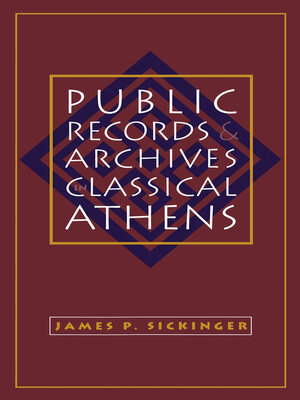Public Records and Archives in Classical Athens
ebook ∣ Studies in the History of Greece and Rome
By James P. Sickinger

Sign up to save your library
With an OverDrive account, you can save your favorite libraries for at-a-glance information about availability. Find out more about OverDrive accounts.
Find this title in Libby, the library reading app by OverDrive.



Search for a digital library with this title
Title found at these libraries:
| Library Name | Distance |
|---|---|
| Loading... |
In this book, James Sickinger explores the use and preservation of public records in the ancient Athenian democracy of the archaic and classical periods.
Athenian public records are most familiar from the survival of inscribed stelai, slabs of marble on which were published decrees, treaties, financial accounts, and other state documents. Working largely from evidence supplied by such inscriptions, Sickinger demonstrates that their texts actually represented only a small part of Athenian record keeping. More numerous and more widely used, he says, were archival texts written on wooden tablets or papyri that were made, and often kept for extended periods of time, by Athenian officials.
Beginning with the legislation of Drakon in the seventh century B.C., Sickinger traces the growing use of written records by the Athenian state over the next three centuries, concluding with an examination of the Metroon, the state archive of Athens, during the fourth century. Challenging assumptions about ancient Athenian literacy, democracy, and society, Sickinger argues that the practical use and preservation of laws, decrees, and other state documents were hallmarks of Athenian public life from the earliest times.
Athenian public records are most familiar from the survival of inscribed stelai, slabs of marble on which were published decrees, treaties, financial accounts, and other state documents. Working largely from evidence supplied by such inscriptions, Sickinger demonstrates that their texts actually represented only a small part of Athenian record keeping. More numerous and more widely used, he says, were archival texts written on wooden tablets or papyri that were made, and often kept for extended periods of time, by Athenian officials.
Beginning with the legislation of Drakon in the seventh century B.C., Sickinger traces the growing use of written records by the Athenian state over the next three centuries, concluding with an examination of the Metroon, the state archive of Athens, during the fourth century. Challenging assumptions about ancient Athenian literacy, democracy, and society, Sickinger argues that the practical use and preservation of laws, decrees, and other state documents were hallmarks of Athenian public life from the earliest times.







